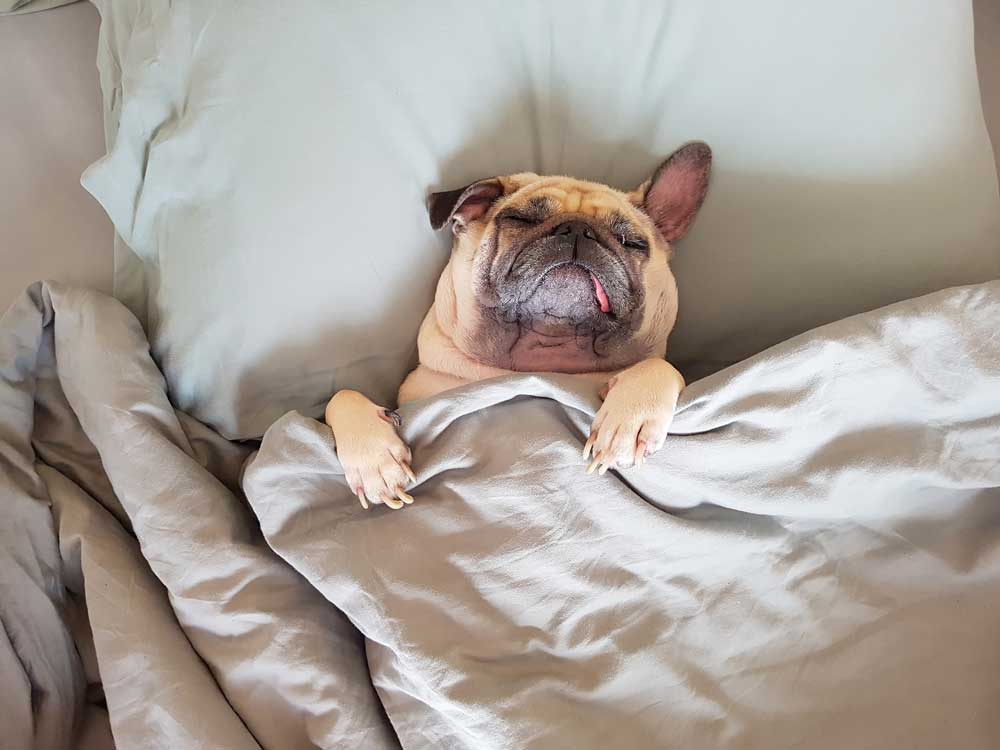
As many dog owners know, training a dog can be a tiring and messy process filled with chewed-up slippers and potty training fails. We live in a world where “dog moms” dominate our Instagram feeds and many dog parents go so far as to compare their fur babies to a newborn baby. So, what do babies and dogs have in common?
Turns out they both need good sleep to learn better, according to recent research.
Similar to humans, dogs also need their beauty sleep for emotional processing. This means that sleep helps your pup process new skills and information, which can help them be more receptive to your training commands. (1)
What Did the Study on Dogs and Training Show?
The findings come from a recent study at ELTE Eötvös Loránd University in Budapest, Hungary. Researchers studied the potential relationship between learning styles and sleep on dog behavior.
“It is natural and ordinary for family dogs to learn in emotionally charged social situations, either from their owners or from dog trainers. However, our knowledge of this phenomenon so far is mainly based on studies in humans and laboratory rodents. Our aim was to study the phenomenon in dogs,” said Vivien Reicher Ph.D., lead author of the study.
To compare the dogs’ ability to learn commands under different conditions, researchers taught them familiar commands but in a new language.
For instance, the dogs were taught the command “high five” in English instead of the familiar Hungarian version, “pacsi.” Their owners were present at the time of each session.
Each dog experienced two different training sessions. In the first session, dogs were not scolded for bad behavior but were rewarded with treats, praise, and pets for good behavior. In the second session, dogs were scolded for bad behavior and even though they received treats for good behavior, they did not get any praise or pets.
After each session, the researchers tested the dog’s ability to learn the new commands before and after sleeping.
So what does all this mean for you and your pup in training?
How Does Sleep Affect Dogs’ Training Abilities?
The study found that sleep helped dogs better retain new commands, which may come as good news to those dog parents who have a pup that loves its beauty sleep.
“The most exciting result is that sleep improved the dogs’ learning performance only in one specific case,” said Márta Gácsi, Ph.D., co-author of the study.
Specifically, the dogs in the study retained training commands better when they slept directly before and after each training session.
Sleep, in addition to several other factors, plays a crucial role in dog training.
“We believe the combined effect of positive surprise and sleep improved their learning success,” said Gácsi.
Is Your Dog Getting Enough Sleep?
When we are sleep-deprived, we find it hard to concentrate or learn and dogs are no different. So, if you want to teach a dog some new tricks, the process should start with some shut-eye.
While many new dog parents express concern that their dog sleeps too much, dogs actually need about 12-14 hours of sleep each day to function at their best, according to the American Kennel Foundation.
But it’s important to note that younger and older dogs usually need even more sleep than that. (2) Puppies and older dogs often sleep 18-20 hours a day to recharge their batteries.
Other Ways to Improve Dog Trainability
While this may come as no surprise to some dog owners, researchers also found that dogs are more likely to retain training when they are rewarded for good behavior with food, praise, and pets. (1)
It can be hard to maintain your cool while training a dog, especially a new puppy. But research shows that dogs learn new skills better when rewarded for positive behavior instead of repetitive scolding for negative behavior.
Hang in there, dog training can be an uphill battle but easy remedies like good sleep and positive reinforcement just might help your pup out in the end.
Sources
- Reicher V, Kovács T, Csibra B, Gácsi M. Potential interactive effect of positive expectancy violation and sleep on memory consolidation in dogs. Scientific Reports. 2024;14(1):9487. doi:https://doi.org/10.1038/s41598-024-60166-8
- Clark H. American Kennel Club. American Kennel Club. Published August 23, 2016. https://www.akc.org/expert-advice/health/why-do-dogs-sleep-so-much/